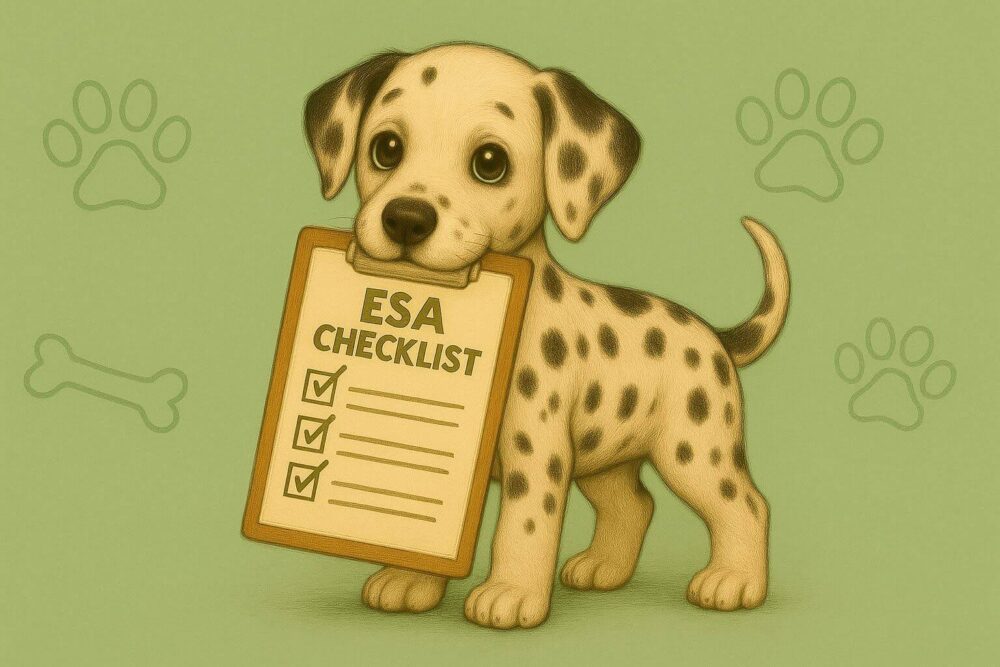
Table of Contents
If you live with an emotional support animal (ESA), you already know how comforting and uplifting a furry friend can be. ESAs help keep your chin up despite symptoms of depression, anxiety, PTSD, or another mental health condition.
Yet, despite their therapeutic benefits, there’s still some stigma surrounding ESAs. Some people are quick to assume they’re just a way to get around pet rules in housing, while others don’t take their purpose seriously.
As an ESA owner, this misunderstanding can become a real challenge, especially if you’re dealing with landlords and rental applications. One common question that pops up due to these fears is: Does having an emotional support animal go on your record?
If you’re in the same boat, this guide will answer all your questions about ESA ownership records to help ease your worries.

What Is a Rental Record?
Also known as rental or tenant history, a rental record is a detailed report of your previous rental experiences. Landlords and property managers create this report to provide information about your reliability, payment history, and other relevant details.
A typical rental record includes:
- Rent payment history, including late payments and outstanding debt
- Previous addresses
- Landlord information
- Potential evictions or lease violations
- Previous landlord feedback or references
When you’re applying for housing, this record is a big deal because landlords use it to assess your trustworthiness, reliability, and behavior. A good rental record can help you land that apartment you’ve been eyeing, as it boosts trust with your landlord.
Landlords and property managers can access your rental records on credit bureaus like Experian, TransUnion, and Equifax. They may also use tenant screening services like E-Renter, RentSpree, Experian RentBureau, and CoreLogic SafeRent to learn more about you.
Does Having an ESA Go on Your Record?
If disclosing your ESA information isn’t something you want, you can breathe a sigh of relief. The fact that you own an ESA won’t typically appear in your rental records.
This has to do with the legal side of things. As an ESA owner, you’re protected under the Fair Housing Act (FHA), which is the main federal law that relates to emotional companions. And while this law makes sure landlords grant you reasonable accommodations for your ESA buddy, it doesn’t require them to make note of your ESA in your tenant history.
FHA and Renting: ESA Rights and Obligations
Other than keeping your ESA info private, the FHA makes sure you’re not discriminated against by:
- Letting you keep your ESA even in properties with no-pet policies
- Preventing your landlord from charging you pet rent or deposit
- Making sure your ESA isn’t denied because of size or breed restrictions
But these federal guidelines don’t come without responsibility. To access these perks and stay by the book, you need to get an ESA letter from a licensed mental health professional (LMHP). If you don’t have this document, landlords are within their rights to treat your cuddly buddy like a regular pet and reject any ESA requests you make.

Does Mental Health Show Up on a Background Check?
Your landlord can look up info about you beyond your tenant history. This is when you might wonder if your mental health records (and by extension, your ESA information) come into play.
Check out which records anyone doing a background check may be interested in and what info they can and can’t find:
- Public records
- Medical records
- Employment records
Public Records
Your landlord might pull up your publicly available info to get a fuller picture of you as a tenant. Think things like court cases, property ownership, and criminal offenses, such as:
- Misdemeanors and felonies
- Pending criminal charges
- Education verification
- Fraud-related convictions
Now, there’s no government list or registry of ESA owners floating around, so they can’t get this info from public records. But what they might be able to find here is ESA-related misdemeanors.
Some states, like California, make it illegal to misrepresent an ESA as a service animal, so your landlord knowing of any such violations is fair game. Still, this doesn’t necessarily mean they’d know anything about your mental health; it just shows you got caught bending ESA rules (which you shouldn’t do!).
Medical Records
Your medical records, including your mental health information, don’t show up in a standard background check. As ESAs are technically part of your treatment for a condition outlined by the DSM-5-TR, this info is private as well.
The HIPAA rule protects the privacy of your sensitive medical details, so your landlord can’t go digging around for your medical records. That’s exactly why your ESA letter doesn’t explicitly state your diagnosis. While your landlord can verify things like your LMHP’s contact details, anything further related to your condition is off-limits.
Employment Records
Your job titles, previous and current employers, and dates of employment all help your landlord gauge your trustworthiness—after all, they have to make sure you’re responsible and will be paying rent with no issues. But while that’s all fine, they can’t get any details about your mental health condition or ESA ownership from your employment records.
Employers are subject to the HIPAA laws and the Privacy Act to ensure the confidentiality of your details, including anything you may’ve shared about your mental health condition. Even if you’ve been known to bring your ESA to work for pets day, the “No Disclosure without Consent” rule prohibits anyone from passing this on without your written consent.

Protecting Your Rental Record as an ESA Owner
While your ESA owner status isn’t something that will generally come up in checks, some things related to having an ESA could still end up damaging your rental record if you’re not careful. Here’s what you can do to avoid this scenario and steer clear of violations or even legal consequences:
- Know your rights and obligations: In addition to adhering to the FHA, don’t forget about state-specific ESA laws. Ensuring full compliance with both will bring you a step closer to a squeaky-clean record
- Keep records: Even after you move in, maintain a record of all interactions with your landlord related to an ESA, including information requests, any fees they tried to charge you, and a copy of the ESA letter. This information can keep you safe if any conflicts arise
- Avoid fake ESA letters: Watch out for online scams like fake ESA letters or overly cheap documentation. This kind of paperwork usually doesn’t meet all legal requirements, and submitting it can land you in hot water with landlords, potentially damaging your record as well
But while these tips can go a long way in protecting your tenant history, completing them is no walk in the park. Between navigating ESA laws and weeding out suspicious letter providers, securing your ESA owner status as a tenant can quickly become overwhelming.
Luckily, with a reliable platform like Your Service Animal, you don’t have to worry about compliance or potential scams. This service adheres to both state and federal law to make sure everything is above board while quickly delivering your ESA letter so you can live with your animal friend undisturbed.
Get a Compliant ESA Letter Online With Your Service Animal
Your Service Animal makes the process of getting a valid ESA letter seamless, so you can apply for the letter online quickly and without breaking a sweat.
To make sure your rental record remains clean, the service connects you with licensed health professionals in your area who follow federal and state laws to a tee when issuing your letter.
Here’s what you can expect when you choose the service:
| Benefit | What It Means for You |
| Free pre-qualification quiz | Take a 3-minute quiz to determine if you’re likely to qualify for the letter. This happens before you proceed with the full process, saving you time, effort, and money |
| Online consultation | Attend a convenient online evaluation. You can complete the whole thing from your couch, with your ESA by your side |
| Legal compliance | Connect with a vetted mental health professional licensed in your state for a fully compliant ESA letter |
| Fast turnaround | You don’t need to wait weeks for your ESA letter. Digital delivery takes 24–48 hours after receiving approval |
| 100% money-back guarantee | If your LMHP doesn’t approve your letter or your landlord doesn’t accept it, get a full refund |
How It Works
When you’re ready to apply for an ESA letter for one or multiple animals, follow these four easy steps:
- Find out if you’re a good fit for an ESA letter with our online quiz
- Schedule an online appointment with a licensed mental health practitioner in your state
- Attend the online call and receive your ESA letter if clinically appropriate
- Receive a full refund if the therapist doesn’t issue an ESA letter or your landlord rejects your letter








